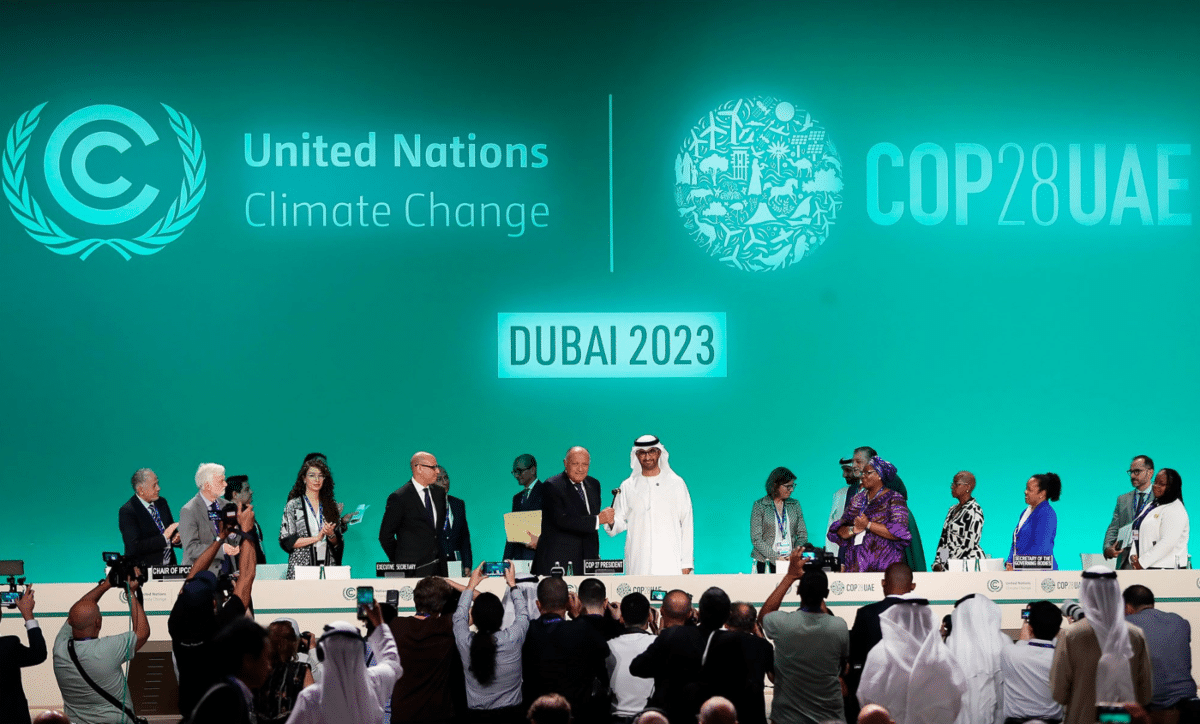Over 190 countries at the United Nations climate conference, popularly known as COP28, agreed to phase out fossil fuels. Here are the must-knows from the conference and whether the climate goals as as ambitious as they seem.
The COP28 calls for “transitioning away from fossil fuels in energy systems, in a just, orderly and equitable manner.” The countries are aiming for net-zero greenhouse gas emissions by 2050, which would be crucial to fulfilling the Paris Accord that calls upon countries to limit global warming to 1.5 degrees Celsius above preindustrial temperatures.
Key Takeaways from COP28
The COP28 agreement also calls for support to those nations that are the most vulnerable to climate change. Among others, the agreement calls for “the development of national response plans; addressing insufficient climate information and data, and promoting equitable, safe and dignified human mobility in the form of displacement, relocation, and migration, in cases of temporary and permanent loss and damage.”
As ironic as it may sound, the two-week conference was held in UAE which is among the biggest oil producers globally. That said, the Middle East is also warming up to green energy and deploying the so-called petro-dollars into clean energy initiatives – both at home as well as globally.
Oil-rich countries are also diversifying into green energy and electric cars
For instance, CYVN Holdings L.L.C., an investment vehicle majority owned by UAE has invested around $740 million into Chinese electric vehicle (EV) company NIO while Saudi Arabia’s sovereign wealth fund has poured billions of dollars into US-based EV startup Lucid Motors.
Meanwhile, COP28 President Sultan al-Jaber termed the COP28 agreement as “historic” and said in his closing address “We have delivered a robust action plan to keep 1.5 within reach” – referring to the Paris climate change targets.
He also called upon countries to act upon the agreement and said, “We must take the steps necessary to turn this agreement into tangible actions.”
Norway’s Minister of Foreign Affairs Espen Barth Eide was also satisfied with the agreement and said, “It is the first time that the world unites around such a clear text on the need to transition away from fossil fuels.”
The agreement wasn’t easy though amid reports of intense lobbying by Saudi Arabia, which is the world’s largest oil exporter and home to Aramco – the biggest oil company globally which briefly surpassed Apple to become the world’s largest company last year.
Middle Ground Finally Reached at COP28
Nonetheless, the COP28 agreement was a middle ground between major oil-producing countries that were working for the very exclusion of “fossil fuel” and Western nations that wanted a total “phaseout” of fossil fuels as part of the final draft
To those who opposed a clear reference to phase out of fossil fuels during the #COP28 Climate Conference, I want to say:
Whether you like it or not, fossil fuel phase out is inevitable. Let’s hope it doesn’t come too late. pic.twitter.com/q2LqMw75K1
— António Guterres (@antonioguterres) December 13, 2023
John Kerry who’s the climate envoy in the Joe Biden administration was also supportive of the final agreement and said, “This is a moment where multilateralism has actually come together and people have taken individual interests and attempted to define the common good.”
Importantly, China was also on board and Zhao Yingming, vice minister of Ecology and Environment of China said that the final document of COP28 “announced the global and irreversible trend toward a green, low-carbon transition.”
Notably, while the West is the champion of climate change at global conferences, China has taken a massive lead in addressing climate change at home. It’s already the world’s biggest market for new energy vehicles (NEVs) and every third car sold in the country is either a battery electric vehicle (BEV) or a plug-in hybrid (PHEV).
In contrast, less than 10% of cars sold in the US are electric. China-based BYD has become the world’s largest seller of NEVs and looks set to soon become the biggest seller of BEVs as well.
Is COP28 Really Ambitious and Path-Breaking?
Most participant countries at the COP28 are touting the agreement as path-breaking but some others don’t see the goals as too ambitious especially as it does not spell a deadline for using fossil fuels.
Anne Rasmussen, lead negotiator for the Alliance of Small Island States is among those who find the final agreement uninspiring. She said, “We have made an incremental advancement over business as usual, when what we really need is an exponential step change in our actions.”
There are also grey areas and loopholes like carbon capture and storage technology in the final agreement. Manuel Pulgar-Vidal, global climate and energy lead for the World Wildlife Fund said, “The outcome suggests there is a considerable role for dangerous distractions such as large-scale carbon capture and storage and transitional fuels.”
Overall, most observers see COP28 as a welcome step forward even if it is incremental and not path-breaking as it might seem at first glance.
All said, the world is currently at a crucial juncture and 2023 is the hottest year on record. From wildfires in Canada to the quite unusual heat waves in parts of Europe, the existential dangers emanating from climate change are now becoming more obvious by the day.
